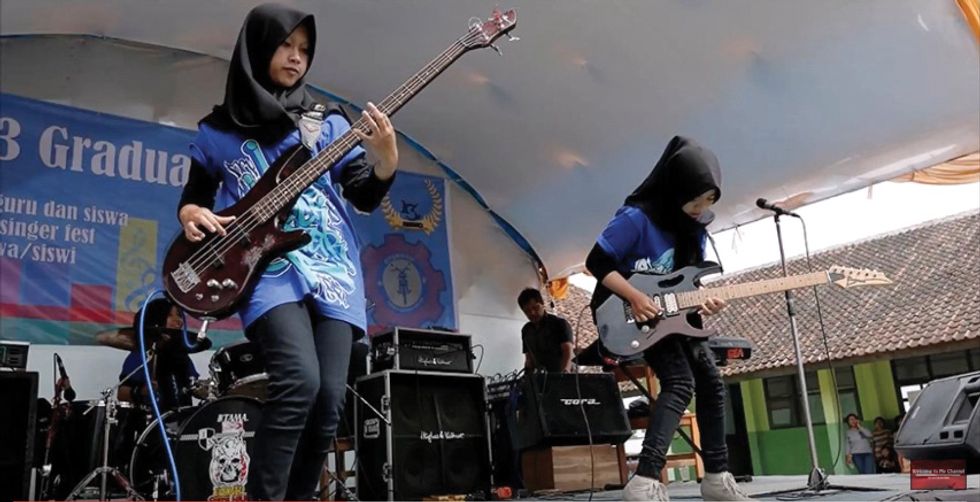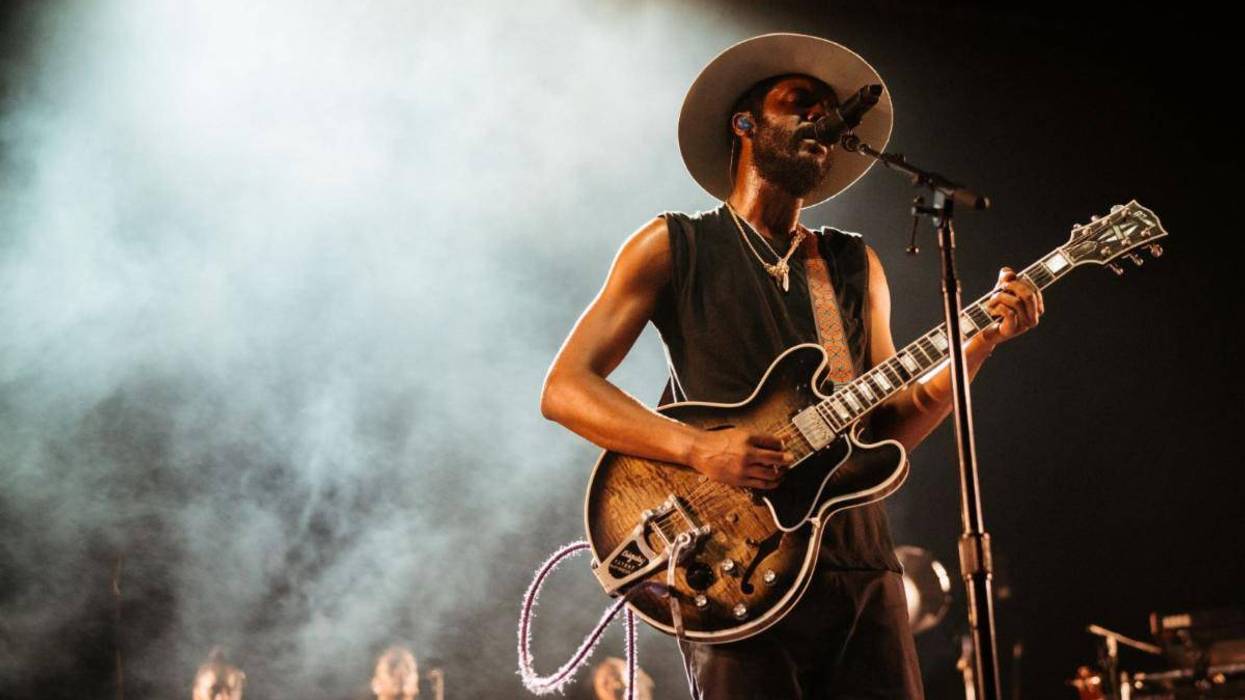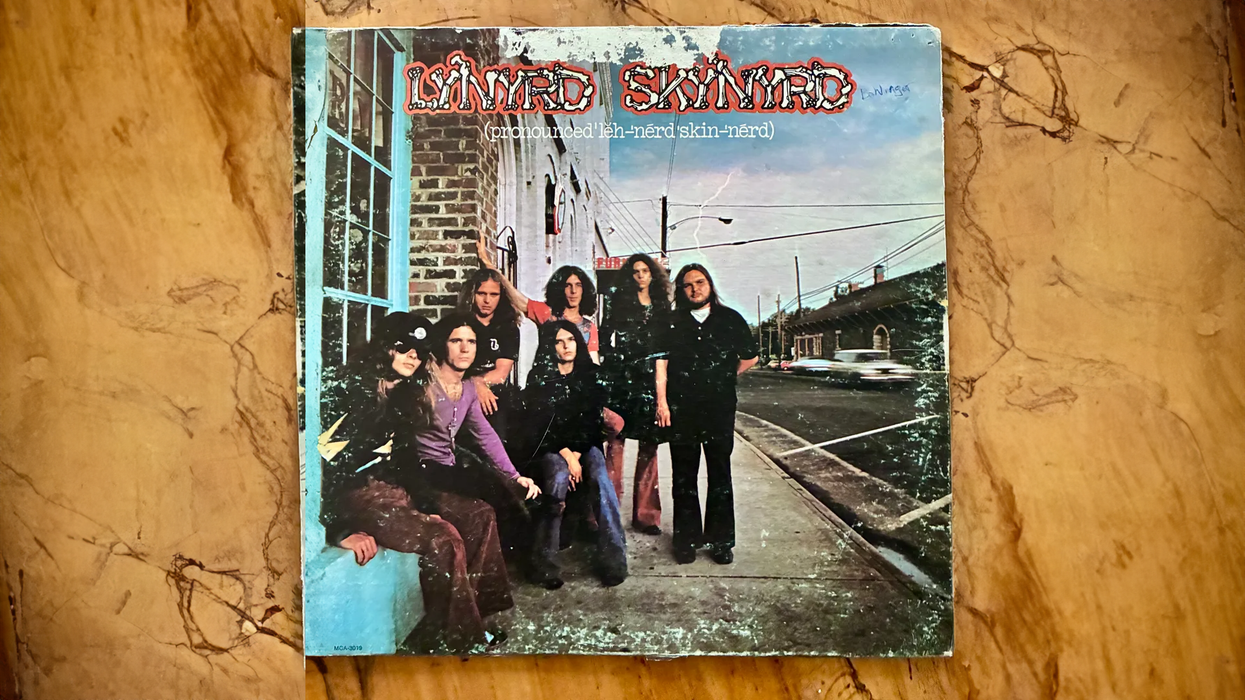At the tail end of a week full of even more news of violence, death, and heartache than usual—from mass shootings in Orlando, San Francisco, and Virginia, to the tragic 24-story apartment fire in London, and U.N. reports of “staggering loss of civilian life” in the fight against ISIS in Iraq and Syria—I can’t blame you if you're yearning to get lost in a disconnected oasis of music, nature, family, friends, and food (and booze, if you’re so inclined). In fact, I don’t see how anyone could not crave that after the week we’ve had.
In the midst of my own nagging urge for life-affirming escape, my mind keeps getting called back to a bit of musical awesomeness that emerged recently—something that’s had the remarkable effect of both helping me hope and reminding me of the need to proactively fight the tendencies that threaten to mire us in bitterness, cynicism, and division. If you haven’t heard of them already, I bid you witness Voice of Baceprot, a metal band comprised of three pint-sized young Indonesian women who happen to be devout Muslims.
As 16-year-old vocalist/guitarist Firdda Kurnia told The Guardian in its recent profile, she and bandmates Widi Rahmawati (bass) and Eusi Siti Aisyah (drums) were exposed to chugging guitars and blistering solos years ago while sifting through the record collection of their school music teacher in West Java.
“I just fell in love with metal since that first time I heard it,” says Kurnia, who wails on both Fender Teles and Ibanez shredder axes. “It felt so rebellious—I think we found ourselves in the music.”
Kurnia, Aisyah, and Rahmawati—who lays down facile fingerstyle runs, complicated slapping-and-popping rhythms, and tapped riffs on a diverse array of basses—formed Baceprot (which means “noise” in the trio’s native Sundanese dialect) in 2014, and since then they’ve been rising in prominence throughout Asia with their mix of originals and covers tunes by the likes of Rage Against the Machine, System of a Down, Slipknot, and Lamb of God.
Initially, what I found so refreshing about VoB is how they smash our preconceptions—which admittedly are kinda stupid in the shrunken world of the 21st century. (If someone like me—who grew up a hardcore Mormon in cloistered little 1980s Provo, Utah—found metal so alluring as a teen, why can’t three Muslim Indonesians do so in the 2000s?)
That said, even in the ostensibly über-open-minded West of today, metal is still viewed in some quarters as the folly of angsty young white men (mostly devil worshippers, according to Sister Judy Fisher back in Provo), so it’s not hard to imagine there’s at least as much of a stigma in other parts of the world. In fact, VoB has taken a lot of heat back home—including death threats. All despite being dedicated to the principles their creed teaches, including wearing hijabs in accordance with beliefs about the importance of modesty.
“We can play metal and protect our morals,” Kurnia told The Guardian. “Of course Islam and metal can match. Why not? Metal is a just a genre of music. The problem is it is often associated with bad things, but it doesn’t have to be.”
Outside their home turf, Kurnia’s gang isn’t just a gender minority amidst a sea of headbanging Y chromosomes. They’re also faithful followers of a religion that—despite being the world’s second largest, one descended from the same Old Testament verses found in Christian Bibles—is somehow also deemed to be about equal to Satanism by an alarming number of Westerners.
Anyway … beyond that preconception stuff, the more I watched videos of Baceprot gigging, the more I also grew to love their bravery, their passion—Kurnia can sound absolutely ferocious when she wants to—and the joy displayed by both the band and its fans.
Check out the video “VoB ( voice of baqitos ) Live Performance On Bantarkalong,” and you’re sure to break out in a grin at the sight of village women and teenage boys crowded around a public bandstand, dancing to Aisyah’s double-bass beats and Rahmawati’s funky grooves.
“I think what we want to say to the young women of Indonesia is, don’t be afraid of being different,” Kurnia said. “Don’t be afraid to shout your independence.”
[Insert big sigh here.] But West Java’s most famous metal outfit isn’t this week’s only reason to reject corrosive mental clichés. Unfortunately, the other reasons are far less inspiring and much more politically and culturally divisive and disheartening. Enough to make you wanna just go back and watch more VoB … perhaps their unplugged cover of the Chili Peppers’ “By the Way.”
But let’s be honest. Kurnia, Rahmawati, and Aisyah deserve huge kudos for standing up and fearlessly rocking out—because they are, no doubt, opening some minds and pioneering some change. But they’re not going to change the world. We can only change ourselves. And we have to want to.
As the finer points of the last several days have shown us—or at least me—one of the most important things is to guard against the inclination to look at superficial outward indicators and make knee-jerk generalizations. Stereotypes may be convenient for the cognitively lazy—and let’s face it, we’re all tempted to indulge far more often than we care to admit—but ultimately this fool’s tool for sorting “us” vs. “them” does nothing more than create artificial barriers that inhibit those on both sides of the wall.
Anyway, let’s get noisy this weekend, yo!


















